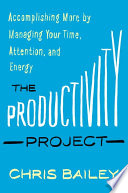

In 'The Productivity Project', Chris Bailey emphasizes the significance of focus as a core element of productivity. In a world saturated with distractions—from smartphones to social media—maintaining focus becomes increasingly challenging. Bailey suggests that to enhance productivity, individuals must cultivate an environment that minimizes distractions. He advocates for techniques such as time blocking, where specific periods are dedicated solely to tasks without interruptions. This focused approach allows for deeper engagement with work, leading to higher quality outputs and a greater sense of accomplishment. Additionally, Bailey explores the psychological aspects of focus, discussing how mental clarity and concentration can be improved through practices like meditation and mindfulness. By prioritizing focus, readers can unlock their potential and achieve more in less time.
Continue readingBailey introduces the concept of energy management as a crucial factor in productivity. He argues that productivity is not solely about time management but also about managing one's energy levels throughout the day. Different tasks require different levels of mental and physical energy, and understanding this can lead to more effective work habits. For instance, Bailey suggests that individuals should identify their peak energy times—periods when they feel most alert and productive—and schedule their most challenging tasks during these windows. Conversely, less demanding tasks can be tackled during low-energy periods. By aligning tasks with energy levels, individuals can enhance their efficiency and reduce burnout, ultimately leading to a more sustainable work-life balance.
Continue readingHabits play a pivotal role in shaping an individual's productivity levels. Bailey delves into the science of habit formation, explaining how small, consistent actions can lead to significant changes over time. He highlights the importance of establishing productive habits that align with personal goals. For example, setting aside time each day for reading or exercise can lead to improved focus and well-being. Bailey also discusses the concept of 'keystone habits'—habits that have a ripple effect on other areas of life. By focusing on these key habits, individuals can create a foundation for greater productivity. The book provides practical strategies for habit formation, such as tracking progress and using accountability partners, making it easier for readers to implement changes in their daily routines.
Continue readingBailey challenges the traditional notion that constant work leads to increased productivity. He argues that rest and downtime are essential components of a productive lifestyle. The book discusses the science behind rest, emphasizing that taking breaks can enhance creativity, problem-solving skills, and overall productivity. Bailey shares his personal experiences with various forms of rest, including sleep, leisure activities, and even deliberate breaks during work sessions. He encourages readers to prioritize rest as a means to recharge and rejuvenate, ultimately leading to more effective work. By incorporating regular breaks and ensuring adequate sleep, individuals can enhance their cognitive function and maintain sustained productivity over the long term.
Continue readingThe environment in which one works significantly influences productivity levels. Bailey explores how physical spaces, social interactions, and even digital environments can affect focus and efficiency. He advocates for creating a workspace that minimizes distractions and fosters creativity. This might include decluttering, optimizing lighting, or using noise-canceling headphones. Additionally, Bailey emphasizes the importance of surrounding oneself with supportive individuals who encourage productivity rather than detracting from it. The book provides practical tips for optimizing both physical and digital environments, such as organizing files and setting boundaries with colleagues. By being intentional about their environments, readers can create conditions that enhance their productivity.
Continue readingBailey encourages readers to adopt a mindset of experimentation when it comes to productivity. He shares his own journey of testing various productivity techniques and strategies, emphasizing that what works for one person may not work for another. This idea of personalized productivity encourages individuals to try different approaches and assess their effectiveness. The book outlines several experiments that Bailey conducted, such as tracking time spent on tasks or implementing new productivity tools. By embracing a culture of continuous improvement, readers can discover what strategies resonate with them and adapt their approaches accordingly. This mindset fosters resilience and adaptability, essential traits in today's fast-paced world.
Continue readingGoal setting is a fundamental aspect of productivity, and Bailey stresses its importance throughout the book. He provides a framework for setting SMART (Specific, Measurable, Achievable, Relevant, Time-bound) goals, encouraging readers to define clear objectives for their productivity efforts. Moreover, Bailey discusses the significance of measuring progress toward these goals. By tracking achievements, individuals can gain insights into their productivity patterns and make informed adjustments. The book includes practical tools for goal tracking, such as journals or apps, to help readers stay accountable. This structured approach to goal setting and measurement empowers individuals to take ownership of their productivity journeys and celebrate their successes along the way.
Continue readingThe reading time for The Productivity Project depends on the reader's pace. However, this concise book summary covers the 7 key ideas from The Productivity Project, allowing you to quickly understand the main concepts, insights, and practical applications in around 24 min.
The Productivity Project is definitely worth reading. The book covers essential topics including The Importance of Focus, The Power of Energy Management, The Role of Habits in Productivity, providing practical insights and actionable advice. Whether you read the full book or our concise summary, The Productivity Project delivers valuable knowledge that can help you improve your understanding and apply these concepts in your personal or professional life.
The Productivity Project was written by Chris Bailey.
If you enjoyed The Productivity Project by Chris Bailey and want to explore similar topics or deepen your understanding, we highly recommend these related book summaries:
These books cover related themes, complementary concepts, and will help you build upon the knowledge gained from The Productivity Project. Each of these summaries provides concise insights that can further enhance your understanding and practical application of the ideas presented in The Productivity Project.